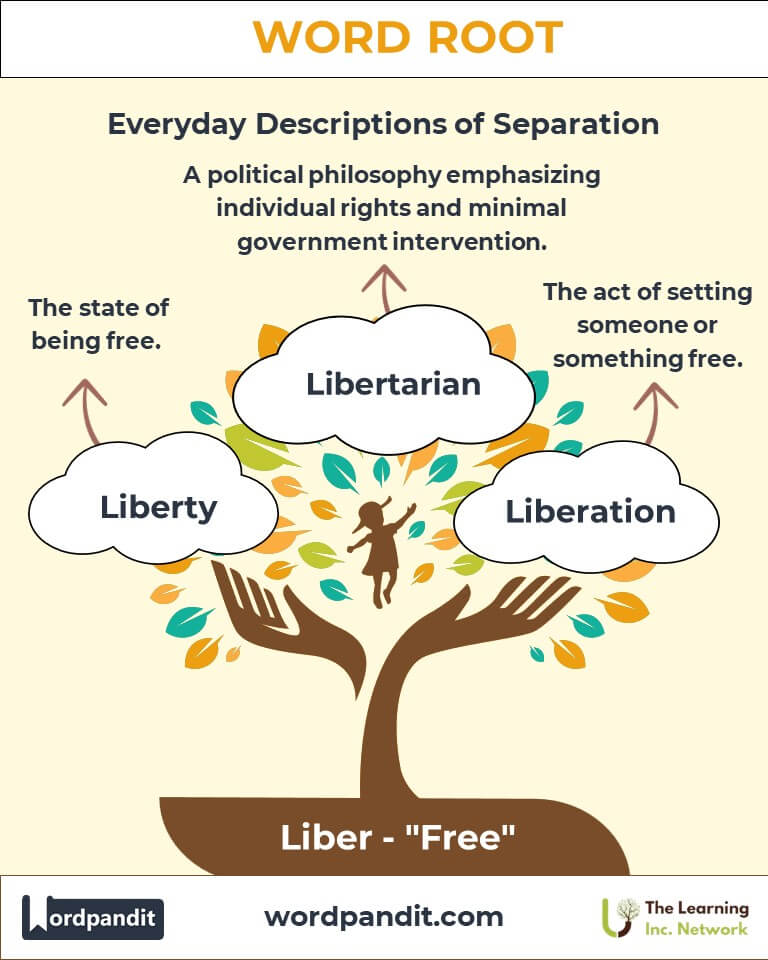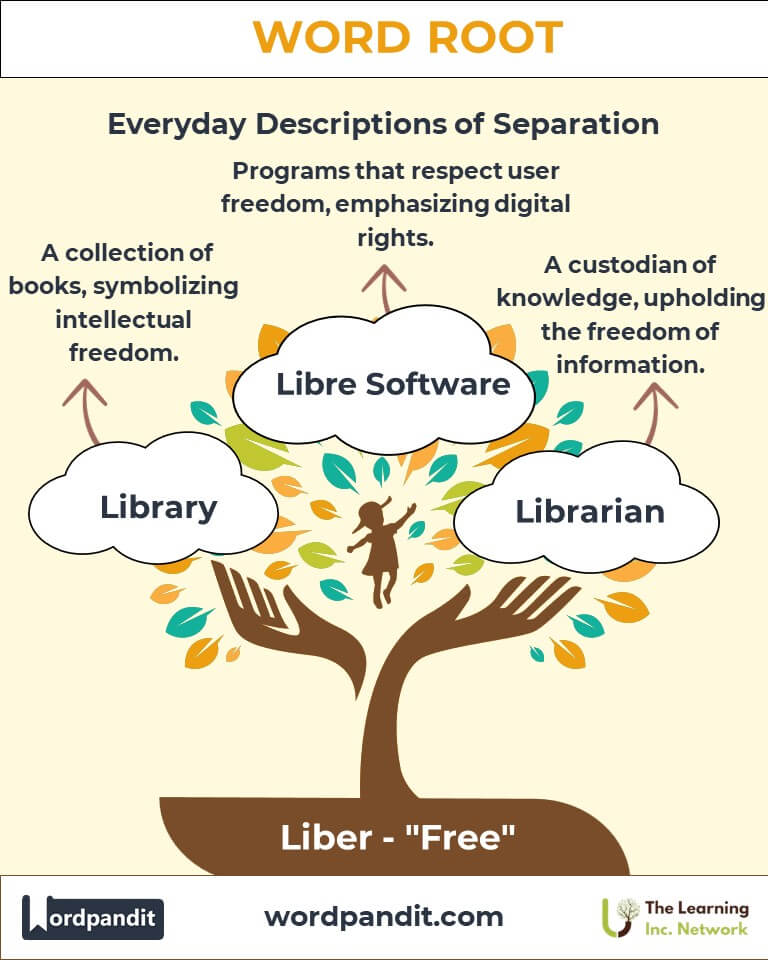Liber: The Root of Freedom in Language and Society
Byline: Discover the liberating essence of the Latin root "liber," meaning "free." From the foundational concepts of liberty and liberation to specialized uses in literature and law, "liber" has influenced words and ideas that shape our understanding of autonomy, rights, and creativity.

Table of Contents
- Introduction: The Essence of "Liber"
- Etymology and Historical Journey
- Mnemonic: Unlocking the Power of "Liber"
- Common "Liber"-Related Terms
- "Liber" Through Time
- "Liber" in Specialized Fields
- Illustrative Story: "Liber" in Action
- Cultural Significance of the "Liber" Root
- The "Liber" Family Tree
- FAQs About the Liber Word Root
- Test Your Knowledge: Liber Word Root Quiz
- Conclusion: The Living Legacy of "Liber"
Introduction: The Essence of "Liber"
What comes to mind when you hear the word "liberty"? Perhaps the iconic Statue of Liberty or the cherished concept of personal freedom. The root "liber," derived from Latin, encapsulates the idea of being free. Pronounced "LEE-ber" (in its classical form), this root has inspired words that reflect independence, creativity, and equality. Across disciplines like politics, literature, and law, "liber" resonates with the universal human aspiration for freedom.

Etymology and Historical Journey
The root "liber" stems from Latin, where it meant "free" or "unrestrained." In ancient Rome, "liber" was closely associated with the status of a free person as opposed to a slave. Over centuries, this root spread through Romance and Germanic languages, influencing terms like "liberté" in French and "libertà" in Italian. By the Enlightenment, "liber" became a cornerstone of revolutionary ideals, inspiring movements for democracy and human rights.
Mnemonic: Unlocking the Power of "Liber"
To remember "liber," picture an open book symbolizing free access to knowledge or an open door representing unbounded opportunities.
Mnemonic Device: "‘Liber’ is the key to liberty, opening the doors to freedom and creativity."
Common "Liber"-Related Terms
- Liberty (LIB-er-tee): The state of being free.
Example: "The Constitution guarantees liberty and justice for all." - Liberate (LIB-er-ate): To set free.
Example: "The soldiers were celebrated for liberating the occupied town." - Liberal (LIB-er-uhl): Open to new ideas, advocating for individual freedoms.
Example: "She held liberal views on education reform." - Liberation (LIB-er-AY-shun): The act of freeing someone or something.
Example: "The liberation movement worked tirelessly to end oppression." - Library (LIB-ruh-ree): A collection of books, originally tied to the concept of intellectual freedom.
Example: "The library is a haven for curious minds."
"Liber" Through Time
- Libertus: In Roman times, a freed slave was called a "libertus," emphasizing the transformative nature of freedom.
- Liberation Theology: A 20th-century movement within Christianity advocating for social justice, highlighting the enduring relevance of "liber."
"Liber" in Specialized Fields
- Law: Liberum veto: In Polish-Lithuanian history, this legal principle allowed any member of the parliament to veto decisions, symbolizing extreme personal freedom.
- Literature: Librarian: A custodian of knowledge, upholding the freedom of information.
- Politics: Libertarian: A political philosophy emphasizing individual rights and minimal government intervention.
- Technology: Libre software: Programs that respect user freedom, emphasizing "liber" in the digital age.
Illustrative Story: "Liber" in Action
In a small village, a young girl named Sofia dreamed of accessing education. When a traveling librarian arrived, offering free books to the community, Sofia’s world changed. She devoured stories about liberation movements and became inspired to advocate for equal education rights. Her efforts eventually led to the building of a community library, where "liber" became not just a root but a living legacy of freedom and opportunity.
Cultural Significance of the "Liber" Root
"Liber" symbolizes more than individual freedom—it represents societal progress. From the Magna Carta to modern constitutions, the root underpins the legal and moral frameworks of justice. In literature, "liber" reflects the freedom of thought, while in technology, terms like "libre software" champion digital rights.

The "Liber" Family Tree
- Lib (Latin: Free):
- Libertarian: Advocating personal freedom.
- Libation: An act of pouring, symbolically tied to release.
- Leg (Latin: Law):
- Legislator: One who creates laws for freedom and order.
- Liberi (Latin: Children): Reflecting the inherent freedom and potential of youth.

FAQs About the "Liber" Word Root
Q: What does "liber" mean?
A: The root "liber" is derived from Latin and means "free." It is associated with ideas of independence, autonomy, and the absence of constraints, influencing words like liberty, liberation, and liberal.
Q: How are "liber" and "liberty" connected?
A: "Liber" is the root, while "liberty" is derived from it. "Liberty" signifies the condition of being free—politically, socially, or personally—and stems from the broader concept encapsulated in "liber."
Q: What does "liberation" mean?
A: Liberation refers to the act or process of setting someone or something free. It is used in contexts like freedom from oppression, imprisonment, or societal constraints.
Q: Why is "library" related to "liber"?
A: The word "library" comes from the Latin word librarium, which relates to "liber," meaning book. Libraries symbolize intellectual freedom by providing unrestricted access to knowledge and ideas.
Q: What does "liberal arts" mean, and how is it connected to "liber"?
A: "Liberal arts" refers to a broad field of study encompassing humanities, sciences, and social sciences. Historically, it denoted education for free individuals (liberi), contrasting vocational training for slaves.
Q: Who was a "libertus" in ancient Rome?
A: A "libertus" was a freed slave in Roman society. While no longer enslaved, a libertus often maintained social ties to their former master, emphasizing the transformative power of freedom.
Q: What is "libre software"?
A: Libre software allows users to run, study, modify, and share programs. Unlike proprietary software, it champions digital freedom, directly reflecting the "liber" root's essence of autonomy.
Test Your Knowledge: Liber Mastery Quiz
1. What does the root "liber" mean?
2. Which term refers to setting someone free?
3. What is "libre software"?
4. Which profession is linked to intellectual freedom?
5. What was a "libertus" in ancient Rome?
Conclusion: The Living Legacy of "Liber"
The root "liber" reminds us of humanity’s enduring quest for freedom—be it physical, intellectual, or digital. As the world continues to evolve, "liber" remains a beacon of hope, guiding us toward greater equality and expression. Let the spirit of "liber" inspire us to cherish and protect the freedoms that define our lives.












